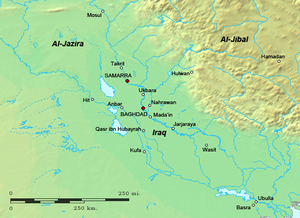Hasan ibn Ustadh-Hurmuz
Abu Ali Hasan ibn Ustadh-Hurmuz (Arabic: أبو علي حسن بن أستاذ هرمز), commonly known after his father as Ibn Ustadh-Hurmuz (ابن أستاذ هرمز) (died 1011) was a Daylamite[1] military officer of the Buyids, and an important figure in the Buyid state during the late 10th century.
Biography
[edit]
Origins
[edit]He was the son of Ustadh-Hurmuz, a prominent Buyid chamberlain (hajib), who, after the death of the Buyid king Adud al-Dawla, began serving the latter's eldest son Sharaf al-Dawla, who was the ruler of Fars, and fought for complete control of the Buyid Empire against his younger brother Samsam al-Dawla, who was the ruler of Iraq. During this period, Ustadh-Hurmuz was appointed by Sharaf al-Dawla as the governor of Oman. However, wishing to change his allegiance to Sharaf al-Dawla's brother, he was forced to retire in 984.
Service under the Buyids of Fars
[edit]During this period, Ibn Ustadh-Hurmuz was about 23 years old and was already in the service of Samsam al-Dawla; but in 987, Samsam al-Dawla was defeated and captured by Sharaf al-Dawla, who shortly annexed Iraq. He, however, died himself one year later, and was succeeded by his younger brother Baha' al-Dawla in Iraq, while Samsam al-Dawla managed to escape from captivity and fled to Fars, where he managed to conquer the entire region, and was joined by Ibn Ustadh-Hurmuz including other of his former officers such as Fuladh ibn Manadhar. In 995, Ibn Ustadh-Hurmuz became the leader of his Daylamite kinsmen in the Buyid army,[1] thus giving him a powerful position in the Buyid Empire. Two years later, he captured Ahvaz, but in the following year, Samsam al-Dawla was killed during a revolt by the sons of the deceased former Buyid ruler Izz al-Dawla.

Service under the Buyids of Iraq
[edit]Ibn Ustadh-Hurmuz quickly used the opportunity to transfer his allegiance to Baha' al-Dawla,[2][3] who became the new ruler of Fars.
In 999/1000, Ibn Ustadh-Hurmuz succeeded his brother al-Hajjaj as governor of Khuzistan, when the latter was sent to become governor of Iraq.[3] In August 1000, he was appointed to the vizierate at Shiraz in place of al-Muwaffaq, before being sent to Baghdad as vizier and governor of Iraq in October 1002.[3] There he managed to defeat his brother, who had risen in revolt and was supported by Kurds and Shayban Arabs.[4] He also defended Iraq against incursions from Batihah and the Hasanwayhid ruler Badr ibn Hasanwayh. Furthermore, Ibn Ustadh-Hurmuz managed to suppress the rebellion of the Uqaylid ruler Qirwash, who had briefly taken control of a few Buyid cities and had changed his allegiance to the Fatimid Caliphate.[5] Ibn Ustadh-Hurmuz later died on 14 December 1010 at Baghdad,[3] and was succeeded by Fakhr al-Mulk, who had previously replaced Ibn Ustadh-Hurmuz in Shiraz, as vizier and governor of Iraq.[1][6] Ibn Ustadh-Hurmuz's father, however, outlived his son, and lived until 1015.
References
[edit]- ^ a b c Kennedy 2004, p. 237.
- ^ Kennedy 2004, p. 236.
- ^ a b c d Busse 2004, p. 242.
- ^ Kennedy 2004, p. 251.
- ^ Kennedy 2004, p. 297.
- ^ Busse 2004, pp. 242–243.
Sources
[edit]- Busse, Heribert (2004) [1969]. Chalif und Grosskönig – Die Buyiden im Irak (945-1055) [Caliph and Great King – The Buyids in Iraq (945-1055)] (in German). Würzburg: Ergon Verlag. ISBN 3-89913-005-7.
- Cahen, Cl. (1971). "Ḥasan b. Ustād̲h̲-Hurmuz". In Lewis, B.; Ménage, V. L.; Pellat, Ch. & Schacht, J. (eds.). The Encyclopaedia of Islam, Second Edition. Volume III: H–Iram. Leiden: E. J. Brill. OCLC 495469525.
- Donohue, John J. (2003). The Buwayhid Dynasty in Iraq 334 H./945 to 403 H./1012: Shaping Institutions for the Future. Leiden and Boston: Brill. ISBN 90-04-12860-3.
- Kennedy, Hugh (2004). The Prophet and the Age of the Caliphates: The Islamic Near East from the 6th to the 11th Century (Second ed.). Harlow: Longman. ISBN 978-0-582-40525-7.
